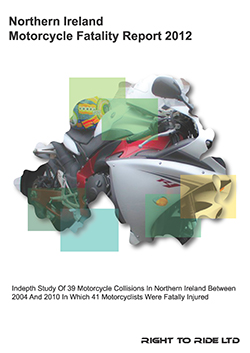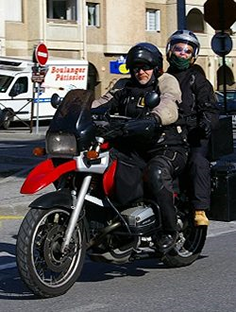 Right To Ride has today published the “Northern Ireland Motorcycle Fatality Report 2012” an indepth study of 39 cases relating to motorcycle fatalities in Northern Ireland (UK) between 2004 and 2010.
Right To Ride has today published the “Northern Ireland Motorcycle Fatality Report 2012” an indepth study of 39 cases relating to motorcycle fatalities in Northern Ireland (UK) between 2004 and 2010.
The study, supported by the British Motorcyclists Federation Foundation, was carried out by Dr Elaine Hardy of Right To Ride with the collaboration of Dr Emerson Callender and Damian Coll of the Road Traffic Collision Investigation Team, Forensic Science Northern Ireland and Dr Richard Frampton of the Transport Safety Research Centre, Loughborough University, England (UK).
The “Northern Ireland Motorcycle Fatality Report 2012” contains an analysis of 39 collisions investigated and includes information relating to vehicle data, the collision scene and the environment as well as human factors.
Overall, 41 motorcyclists were fatality injured, equal to 36% of total motorcycle fatalities during 2004 and 2010 in Northern Ireland.
Evidence
The evidence provided in this report indicates that each road traffic collision is unique but that in all cases the time frame from the perceived hazard to the conclusion of the impact either with another vehicle or with road infrastructure was typically between 2 and 3 seconds.
In 63.4% of cases, (n.26/n.41) motorcyclists applied their brakes prior to the collision and n.18 (43.9%) applied their brakes severely. Of the n.17 (41.4%) motorcycles that slid after falling, n.10 (24.4%) fell onto their right side and the remaining n.7 (17.1%) fell onto their left side. There were two cases identified where Anti-Lock Braking Systems (ABS) may have made a difference to the outcome of the collision, both were on a straight section of road.
Analysis
Of the 39 cases analysed, there were 17 cases (43.6%) in which another vehicle was considered the primary cause of the collision. In thirteen of these cases (76.5%), the evidence highlighted that the motorcycle’s lights were switched on and therefore the other vehicle driver was in a position to see them. However, there appears to be a problem of looking but not seeing which may be due to the size of the motorcycle or simply because the car/van driver is expecting to see another car or van and has difficulty coping with the unexpected.
There were four cases (10.3%) of speeding, but in all cases, the actions of the other vehicle driver precipitated the collision. Equally there were four known cases (10.3%) in which the rider had levels of alcohol over the legal limit and or drugs in their blood. Three of these collisions were single vehicle (no other vehicle involved) and the fourth ran a red light through an intersection with no headlights on and impacted a car crossing the intersection.
There were 9 cases (23%) in which the motorcyclists involved in a collision were either riding in a group or with another motorcyclist. In all these cases the total number of motorcyclists killed was n.11/n.41 (26.8%).
Focus Group
A focus group of trainers, a collision investigator, police and government agency representatives discussed the relevance of technology on vehicles as a deterrent to collisions as well as the advantages of teaching hazard perception and anticipation in initial and advanced training as a defence against potential collisions.
The consensus was that while technology may in some cases be beneficial, good training was more important.
However, the availability, image and cost of advanced training seemed to be a barrier to getting more riders involved.
According to the participants of the focus group, the best solution to avoid road traffic collisions is anticipation and hazard awareness.
The consensus was that the only reliable way to prevent motorcyclist injuries and deaths is to prevent the collision in the first place, which means the rider needs to get his/her eyes up and scanning ahead, taking evasive action when a potential collision is still several seconds from happening.
“Northern Ireland Motorcycle Fatality Report 2012” – pdf 1.1mb – Click Here
Contact
Dr Elaine Hardy
Director of Research
Right To Ride Ltd
.



NI Motorcycle Fatality Report 2012 featured on:
Road Safety GB – Click Here
Italian riders organisation AMI (Associazione Motociclisti Inc…olumi) website – Click Here